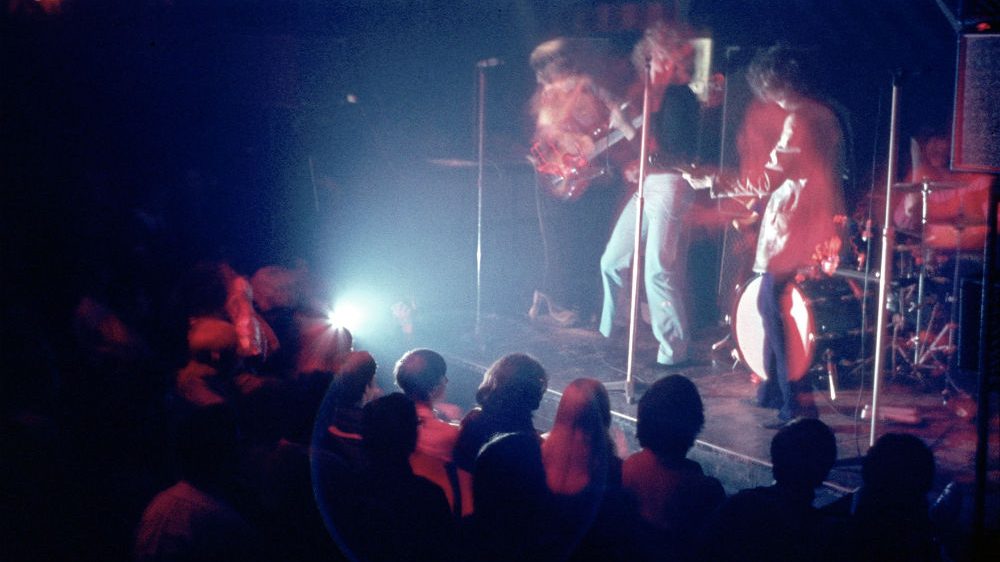50 Years Ago, Led Zeppelin Held Its First Rehearsal: ‘The Whole Room Just Exploded’
By Jem Aswad
LOS ANGELES (Variety.com) – Sometime during the week of Aug. 12, 1968, the band that would take over the world as Led Zeppelin held its first rehearsal in a small room in London.
The preceding May, Yardbirds guitarist and session veteran Jimmy Page found himself without a band when the other three members — who’d seen some success since the group first formed in 1963, but had fallen out of fashion — abruptly quit. With a Scandinavian tour already booked, Page and manager Peter Grant united bassist/keyboardist and fellow sessioneer John Paul Jones (with whom he’d performed on songs by Donovan and others) with two young musicians from the British Midlands, singer Robert Plant and drummer John Bonham, both 20, who’d performed together in a group called Band of Joy. (Page’s initial choices were singer Terry Reid — whom he’d seen when Reid was a fellow opening act with the Yardbirds on a Rolling Stones 1966 tour — and Procol Harum drummer B.J. Wilson, with whom he’d played on Joe Cocker’s “With a Little Help From My Friends” album. Both declined.)
As the new quartet launched into the R&B chestnut “Train Kept A’Rollin’,” a Yardbirds live staple that the group had recorded in 1965, the chemistry, according to all four members, was instant.
“We first played together in a small room on Gerrard Street, a basement room, which is now Chinatown,” Jones recalled in 1990, according to the band’s website . “There was just wall-to-wall amplifiers, and a space for the door — and that was it. Literally, it was everyone looking at each other, ‘What shall we play?’ Me doing sessions, didn’t know anything at all. There was an old Yardbirds’ number called ‘Train Kept a Rollin’.’ The whole room just exploded.”
“I could feel that something was happening to myself and to everyone else in the room,” Plant remembered. “It felt like we’d found something that we had to be very careful with because we might lose it, but it was remarkable — the power.”
While no recordings from the rehearsal have surfaced, that first song — which would be the group’s live opener for most of its first year of existence as well as its final 1980 tour, yet was never properly recorded — probably sounded like this performance from the San Francisco’s Fillmore West the following April.
“At the end, we knew that it was really happening, really electrifying,” Page said. “We went from there to start rehearsals for the album.”
Later that month the group did a session for singer P.J. Proby’s “Three Week Hero” album — Jones was already booked as the arranger and hired the others — and made their live debut with the nine-date tour of Scandinavia as the New Yardbirds before heading into London’s Olympic Studios in September to record their debut with ace engineer Glyn Johns. While legendary for such songs as “Communication Breakdown,” the blues classic “I Can’t Quit You Baby” and the electrified folk song “Babe I’m Gonna Leave You,” the outtakes show that the group explored other territory in the sessions, also included more pop-oriented material like the soul-inflected “Baby Come on Home,” which would have cast the album and the band in a different light.
From that point on, the ascent escalated quickly. The band played its first U.K. show on Oct. 4 at the legendary rock club the Marquee (the group is pictured above performing at the club two weeks later), signed with Atlantic Records in November, launched its first U.S. tour on Dec. 26 and released the album the following month.
The group played an incredible 145 shows in 1969, and by the end of the year they had released their blockbuster “ II” (featuring their breakthrough single “Whole Lotta Love”) and were headlining venues like London’s Royal Albert Hall, New York’s Carnegie Hall, the Boston Garden and Detroit’s Olympia Stadium. The group went on to become one of the most popular rock bands in history, dominating the 1970s and according to unofficial estimates, selling more than 200 million albums worldwide.

